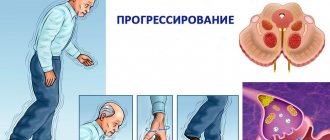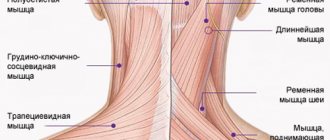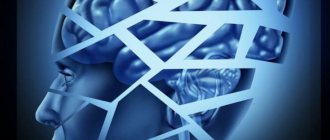Autism in women manifests itself as difficulties in social interactions. There is increased emotional and sensory sensitivity, significant success in the chosen field, with a tendency to limit the range of interests. Most patients are sufficiently compensated, but experience difficulties in contacting others, building romantic relationships, and organizing everyday life.
Call tel. 8(969)060-93-93 , our operator will help you choose the right specialist and make an appointment for you at a convenient time.
Diagnostic problems
According to statistics, girls suffer from autism five times less often than boys. At the same time, researchers point out that in women, on average, symptoms are detected later, and diagnosis takes longer. Presumably, this is explained both by differences in the manifestations of the disorder and by different assessments of the personality characteristics of girls and boys.
It has been found that parents of boys are three times more likely to express concerns about social difficulties compared to parents of girls. Why this happens is still unclear. Experts consider two hypotheses most likely. The first is that boys are expected to be more active, persistent and sociable. Second, girls adapt better and hide their social difficulties more successfully.
According to research, girls with autism spectrum disorders create better friendships and are often closer to the average in terms of this indicator. In addition, girls are more inclined to copy the behavior of others, and therefore do not stand out from the environment where boys often try to isolate themselves.
Other signs of SA in adults
Aspergers are characterized by an amazing passion for what they love. They immerse themselves in it, day and night, studying the object of their admiration. In a favorable situation, they become excellent masters of their craft and achieve great success.
Maria was passionate about languages: she was fluent in German and English, and spoke fluent French and Italian. When she decided to also learn Hindi, the teacher was skeptical. The group members had already studied all the grammar and were learning to read, while her knowledge was zero. But after a couple of weeks, she was ahead of her classmates by a wide margin, because she spent all her days and nights studying the language.
If Aspies do what they love, they give themselves completely to it. As a rule, their interests are very specific and narrowly focused.
Aspergers have an amazing attention to detail. They are meticulous and pedantic. Each item is strictly in its place. But this trait is not total - among them there are also those who pay little attention to minor details.
Often, high anxiety in people with AS causes them to develop OCD - obsessive-compulsive disorder. It manifests itself in the repeated repetition of actions that do not matter. Repetitive body movements, usually tapping fingers, twitching shoulders, swaying, fixating on an object, for example, toothpicks, pathological counting - counting steps.
Aspie people are incredibly conservative. It is difficult for them to move away from their usual daily routine. They plan their day carefully. Waking up in the morning and getting ready for work, they plot out the route they will follow. They are required to think through several options for different occasions and pay attention to what emotions they will experience on the road. They think through every upcoming event to the smallest detail. And they decide whether it is worth the effort that will have to be made to implement it.
Executive functioning difficulties are problems in the implementation of planning, organizational skills, etc. For example, a person with Asperger's syndrome may find it difficult to integrate individual parts into a coherent whole. Their concentration suffers and it can be difficult to direct their thoughts in the right direction.
Physically, Aspergers are not much different from ordinary people. But they are characterized by some clumsiness in their movements. Because of this, it becomes difficult for such people to master certain sports or writing; their posture and gait have a special pattern.
When communicating with those suffering from the syndrome, you may be wary of the nature of their speech. She is monotonous and slow, although she has a rich vocabulary. Their speech is delivered correctly, filled with terms and scientific concepts, but its imagery is incomprehensible to Aspergers. They do not understand the meaning of proverbs, sayings, irony and humor, are incapable of generalizations, and cannot apply one rule to several situations.
Since in most cases patients are not able to understand the feelings and emotions of another person, their entire conversation is directed towards themselves. More precisely, it is a monologue in which the Aspie talks about his hobbies, etc. When they are taught that in a conversation you should be interested in the life of your interlocutor, they can be discouraging with their questions. “What is it like to be an alcoholic?” they ask a person addicted to alcohol. Or: “How much do you keep in your bank account?” There are no unspoken rules of communication for them.
Their thinking is at a high level, they solve complex, specifically structured problems. However, it lacks flexibility and the ability to think creatively.
How it manifests itself
In most cases, there is a high-functioning variety of the disorder. Despite successful external compensation of symptoms, in female autism there are a number of differences in the areas of emotions, intelligence and social interactions. The list of common signs includes:
- the convenience and practicality of clothing are valued above beauty and fashionable standards;
- no need to make significant efforts to improve one’s appearance, simple hairstyle, minimal makeup;
- behavior, voice and appearance may resemble those of children even in middle-aged and elderly patients;
- the nonverbal component of communication is more pronounced than in men with a similar disorder;
- there is a tendency to lose a sense of one’s own personality, to reproduce the behavior of other people;
- the need to escape reality by immersing yourself in computer games, books and films;
- strict adherence to the rules, a high level of internal discipline, stable habits;
- the comfort zone coincides with the control zone; they prefer to be at home or in a familiar place.
Intellectual signs are success in studying psychology, literature, foreign languages, high abilities in a certain field (music, painting, science, working with computers). With personal interest, he successfully learns independently. He easily receives a good education, but during his studies he suffers from social problems. With a high IQ, he absorbs new data rather slowly. Perceives diagrams or texts better than verbal information.
In the emotional sphere we observe:
- a combination of impressionability and inexperience;
- there is often a tendency to anxiety and sudden mood swings, nervous breakdowns are possible;
- sometimes reacts paradoxically to medications taken;
- at a high level of anxiety, he makes stereotypical movements: he pulls his hair, stamps his feet, taps his fingers;
- against the backdrop of overload, cannot restrain emotions, breaks down even in front of others;
- expresses violent anger at misunderstanding and injustice.
In social communication, sometimes he deliberately creates the impression of rudeness and unfriendliness. As a rule, she behaves shyly and does not like to be the center of attention, but if the conversation touches on a topic that is important to her, she actively participates in the discussion. Fatigue and exhaustion with intense or prolonged social contact.
He doesn’t like women’s conversations and activities, so he has difficulty finding friends with common interests. Easily tolerates loneliness and remains faithful in relationships. Due to the uniqueness of sensory perception, he either strongly dislikes sex, or, on the contrary, experiences powerful sexual pleasure. Behaves awkwardly when trying to initiate romantic relationships.
Touch Sensitivity
As Aspergers themselves state, their world is much louder than that of the average person. This is due to increased sensitivity to any stimuli, be it smells, touches, sounds, or visual images. It has been established that a similar phenomenon occurs in approximately 40% of people with AS. A hypersensitivity reaction can be triggered by anything: air temperature, bright light, food, clothing such as scratchy wool or labels on the underside, the touch of other people or large accumulations of them.
For example, when riding on public transport (subway, train, bus), Aspies sometimes use earplugs or headphones that play their favorite music. The mass of people, stuffiness and noise irritate them, unbalance them and lead to stressful conditions. Music helps to distract and calm down. When the situation becomes extremely tense, they have to leave it, go off the route to stand alone and enjoy the silence, and then continue on foot.
There are special types of therapy to cope with sensory problems. One of them is sensory integration therapy. Its essence lies in deliberate contact with unpleasant stimuli, occurring gradually and in doses. Thus, a person begins to get used to such collisions, no longer feeling irritability and panic.
It is very important for Aspergers to identify a method or strategy for neutralizing unpleasant impulses. For some, this solution is a small dose of alcohol. According to Aspies, it muffles all obsessive sensations and helps reduce stress levels. Someone needs to retire for a while, wander through empty streets, someone swings on a swing.
Cost of services
| CONSULTATIONS OF SPECIALISTS | |
| Initial consultation with a psychiatrist (60 min.) | 6,000 rub. |
| Repeated consultation | 5,000 rub. |
| Consultation with a psychiatrist-narcologist (60 min.) | 5,000 rub. |
| Consultation with a psychologist | 3,500 rub. |
| Consultation with Gromova E.V. (50 minutes) | 12,000 rub. |
| PSYCHOTHERAPY | |
| Psychotherapy (session) | 7,000 rub. |
| Psychotherapy (5 sessions) | 30,000 rub. |
| Psychotherapy (10 sessions) | 60,000 rub. |
| Group psychotherapy (3-7 people) | 3,500 rub. |
| Psychotherapy session with E.V. Gromova (50 minutes) | 12,000 rub. |
This list does not contain all prices for services provided by our clinic. The full price list can be found on the “Prices” , or by calling: 8(969)060-93-93. Initial consultation is FREE!
When to see a doctor
In adults, autism is treated by a psychotherapist. If necessary, the specialist can refer you to a psychiatrist or other specialist. You should seek medical help if you have the following symptoms:
- lack of desire to communicate with others, including loved ones;
- lack of desire to participate in group activities or general conversations;
- passivity or irritability appeared;
- complete ignorance of events in your life and in the lives of loved ones;
- stereotypical movements appeared, a tendency to repeat phrases;
- the sense of real time is lost.
People with autism may not be aware of the problem. In such cases, it is recommended that relatives consult a doctor.
JSC "Medicine" (academician Roitberg's clinic) in Moscow offers the services of qualified psychotherapists in the field of autism treatment. The clinic is located at 2nd Tverskoy-Yamskaya Lane, building 10, a 5-minute walk from the Mayakovskaya metro station. Highly qualified psychotherapists and the use of modern treatment methods allow patients to be confident in the success of therapy.
Treatment
Complete elimination of symptoms is impossible; manifestations persist throughout life. The goal of therapy is to correct the emotional background, reduce the level of anxiety, increase social competence, and successfully adapt to society. According to indications, patients are prescribed antidepressants, sedatives and anti-anxiety drugs, and other drugs. The most important role is played by psychotherapy with the participation of a specialist who is well acquainted with the specifics of the work. When choosing a technique and conducting psychotherapeutic correction of autism in adult women, the following aspects are taken into account:
- Difficulties in communication . Clients are accustomed to hiding their discomfort and high levels of stress. In this regard, the psychologist may have difficulties interpreting non-verbal signals, which entails an incorrect assessment of the client’s experiences. Patients, in turn, find it difficult to recognize the therapist’s communication signals, which complicates the formation of a psychotherapeutic alliance.
- Problems expressing feelings . Outwardly, women with autism often appear unemotional, but in fact, they are characterized by intense, deep emotions that are difficult to express outwardly. Many people either suffer from alexithymia or deliberately suppress their feelings because they are afraid of losing their temper. Therefore, the psychologist’s call for open expression of negative emotions may cause confusion or resistance.
- Wrong interpretation . Specialists in some areas are aimed at looking for the sources of problems in the client’s traumatic past. Meanwhile, the basis of an autistic person’s difficulties is often not childhood trauma, but the peculiarities of brain functioning. At the same time, this does not at all exclude the influence of a traumatic component, for example, bullying during school years, so leaving this topic without attention also seems to be the wrong tactic.
Along with the above, the work takes into account difficulties in completing homework, the need to focus on practical strategies, the effectiveness of the educational component and the use of visual materials (diagrams, tables, computer modeling). With sufficient training of a specialist, psychotherapy provides good results, helps restore mental balance, improve relationships with oneself and others, and increase the level of adaptation.
To schedule a consultation, just call 8(969)060-93-93.
Causes
Autism manifests itself in adults, the symptoms of which can have varying intensity, as a result of genetic mutations that determine the functioning of the nervous system. The onset of autism in adulthood can be associated with various external influences (infections, stress, overwork, etc.). The exact causes of autism have not yet been established, but modern scientists are increasingly calling autism in children a genetic disease that develops under the influence of various negative factors.
The main non-genetic causes of autism are:
- metabolic disorders and inappropriate diet;
- Pregnant women taking medications when there is a threat of miscarriage;
- disorders of bone development;
- disorders of brain activity;
- entry of hazardous substances into the body, etc.
Scientists believe that in most cases, autism, the causes of which depend on external factors, progresses when a person is in an unfavorable psychological environment and under severe physical stress.
Forecast
Autism is not as scary as it might initially seem, so parents should understand that if their child is diagnosed with this, he can grow up to be a full-fledged person, can successfully graduate from school and even start a family in the future. To do this, it is important to follow all the recommendations of specialists, create an atmosphere in the family favorable for the growth and development of the child, and provide proper care for him. It is also important to know the main symptoms of autism and carefully monitor the behavior of a child of primary preschool age in order to notice signs of such a nervous system disease in time and promptly seek help from a specialist.
Autism: what is it?
Autism is a disorder of psychological as well as mental development.
The disease is accompanied by a pronounced lack of emotional expression and lack of desire to communicate. The word “autism” itself is translated as a person who withdraws into himself. Thus, patients suffering from this disease are prone to carrying out actions that lack social meaning. Also, these people never show emotions, and there are no gestures in their interactions with others. Early childhood autism is diagnosed in preschool children. The initial symptoms of the disease, as well as the characteristics of its manifestation, depend on the form of the pathology. Most often, at the initial stage, the pathology is accompanied by disturbances in speech, gestures, and facial expressions during communication.
Self-care and personal hygiene
Some teens may need reminders to shower and shave. They may not understand the connection between self-care and social acceptance, or they may lack social motivation to look neat and smell good. “They may be ostracized for personal hygiene problems, but they may not make the connection or they may lack the skills to deal with the problem,” Dr. Kiefer says.
Saisil-Kira recommends doing some detective work to determine what exactly is stopping your teen from showering. Does he understand the importance and principles of good hygiene? Does he have sensory issues? Perhaps he can't stand having water poured on his head. In this case, she says, "Give him a ladle to wash his hair with so he can control the flow of water."
However, even good hygiene cannot protect against the disappointments and insecurities that always accompany adolescence. The social world of teenagers is made up of cliques and pack hierarchies, and it becomes much more complex in high school. Plus, the dating world comes with a lot of unwritten rules, and students with ASD can feel like outcasts.
Problems with social and communication skills are major risk factors for bullying. A study by the Autism Interactive Network found that adolescents with ASD experience bullying at a much higher rate than their siblings without autism, and that bullying peaks between 5th and 8th grade.
Paraautism: concept, symptoms
Paraautism is a conventional designation for similar psychological phenomena from the group of developmental disorders in children, which are similar to the symptoms of ASD or schizophrenia.
The prefix “para” denotes the presence of some differences from the standard symptoms.
Causes:
- lack of emotional closeness between mother and child (usually seen in dysfunctional families);
- orphanhood – children deprived of parental love and full-fledged family relationships;
- lack of communication with others due to pathology: cerebral palsy, deafness, etc.;
- long-term “information hunger” - forcibly detaining children in a limited space, without access to society;
- the body’s defensive reaction to threat or stress - domestic violence, constant scandals, etc.
Symptoms of paraautism:
- lack of emotionality (children do not smile, do not show any reaction to new toys, sounds, etc.);
- kids show no interest in communication;
- no response to own name;
- lack of interest in children's fairy tales, games, and pictures;
- ignoring pets;
- poor indicative responses - without motor and speech reactions, they can only follow with their eyes;
- speech problems may occur later.
If you ignore all these symptoms for a long period of time, complications (somatized) are likely to occur:
- nightmares;
- eczema;
- diathesis;
- enuresis;
- neurodermatitis;
- viral diseases with severe complications.
Depression, isolation, and tearfulness are often observed. Cognitive, emotional and volitional skills are gradually distorted.











